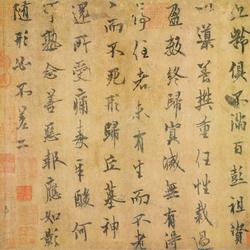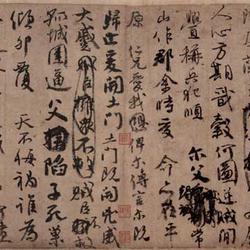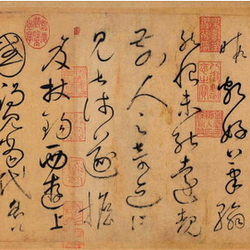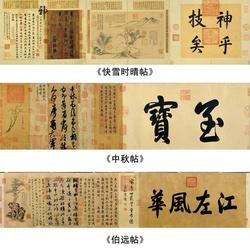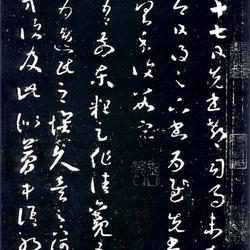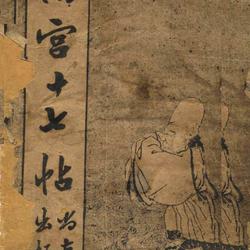Eastern Jin Dynasty. Wang Xizhi's "Lanting Preface" - the best running script in the world
【Name】Shenlong Benlanting
【Category】Chinese calligraphy
【Author】Feng Chengsu (F)
【Form】Silk
【Era】Tang Dynasty
[Original size] 43 cm vertical, 80.5 cm wide
【product size】
[Current Situation of Cultural Relics] Collection of the Palace Museum, Beijing

"Lanting Preface" is also known as "Lanting Banquet Collection Preface", "Lanting Collection Preface", "Linhe Preface", "Ye Preface" and "Ye Tie". One of the three major running script calligraphy posts. "Lanting Preface" expresses the highest state of Wang Xizhi's calligraphy art. The author's magnanimity, spirit, mind, and emotions are fully expressed in this work. The ancients said that Wang Xizhi's writing style was like "the breeze comes out of the sleeves and the bright moon enters the arms", which is a wonderful metaphor. Today's so-called "Lanting Preface", in addition to several Tang copies, stone rubbings are also extremely precious. The most legendary one is "Song Tuoding Wulanting Preface". Whether it is a copy or a rubbing, it is quite convincing for the study of Wang Xizhi. At the same time, it is an extremely precious material for the study of calligraphy of past dynasties.
On March 3rd in the ninth year of Yonghe (AD 353) of Emperor Mu of the Eastern Jin Dynasty, Wang Xizhi, Xie An, Sun Chuo and other 41 people went to "repair evil spirits" at Lanting Pavilion in Shanyin (now Shaoxing, Zhejiang). Everyone wrote poems at the meeting. Wang Xizhi's manuscript preface to their poems. The preface describes the beauty of the mountains and rivers around Lanting and the joy of the party, expressing the author's feeling that good times do not last long and life and death are impermanent. The text of the Dharma calligraphy passed down from generation to generation has a total of 28 lines and 324 words. The composition, structure and writing style are all perfect. The character "Zhi" in it is written in 20 different ways, which is a masterpiece. It was his proud work when he was thirty-three years old. Later generations commented that "Youjun's font is a change from the ancient method. Its majestic and elegant style comes from nature, so it is regarded as a follower in ancient and modern times." Therefore, calligraphers of all ages have praised "Lanting" as "the best running script in the world". Among the extant Tang Dynasty ink imitations, the "Shenlong Edition" is the best. During the reign of Emperor Taizong of the Tang Dynasty, Feng Chengsu had a gold seal, so it is called "Lanting Shenlong Edition". This edition is a fine copy, with brushwork, ink style, style, and charm all reflected, and is recognized as such. It is considered to be the best copy; among the stone carvings, the "Dingwu version" is preferred. After Guo Moruo's research, he believed that the second half of the "Lanting Preface" that was passed down was gratuitous and had no similarities with Wang Xizhi's thoughts. The style of the calligraphy was also different from the epitaphs of the Wang family in the Eastern Jin Dynasty that had been unearthed in recent years, and he was suspected to have been forged by the Sui and Tang Dynasties. But there are also those who disagree with it.
Regarding "Lanting Preface", there are all kinds of interesting anecdotes circulating in the world. It is said that after Wang Xizhi finished writing, he was very satisfied with his work. He rewrote several articles but could not reach this level. He once sighed and said: "This god can help my ears, but I can't do it." Therefore, he himself also He cherished it very much and regarded it as a family heirloom, which has been passed down to his 7th generation Sun Zhiyong. Zhiyong became a monk as a young man and loved calligraphy. Before his death, he passed the "Preface to the Lanting Collection" to his disciple, Monk Biancai. Monk Biancai also studied calligraphy very well. He knew the value of "Preface to the Lanting Collection" and regarded it as a treasure, hiding it in a hole specially dug in the beam of his bedroom.
Li Shimin, Emperor Taizong of the Tang Dynasty, loved calligraphy, especially Wang Xizhi's calligraphy. He heard that Wang Xizhi's calligraphy treasure "Preface to the Lanting Collection" was in the possession of Monk Bancai, so he sent people to ask for it many times, but Monk Bancai always claimed that he did not know the whereabouts of the original work. Li Shimin saw that force would not work, so he decided to outwit him. He sent Xiao Yi, the supervisory censor, to dress up as a scholar and get close to Biancai, looking for an opportunity to obtain the "Preface to the Lanting Collection". Xiao Yi also studied calligraphy very much, and had a very good conversation with Monk Biancai. After the two became close, Xiao Yi deliberately took out some of Wang Xizhi's calligraphy works for Monk Bancai to appreciate. After reading it, Bencai said disapprovingly: "It's true, but it's not good. I have an authentic copy that's not bad." Xiao Yi asked what the post was, and Bencai mysteriously told him that it was the original "Preface to the Lanting Collection". Xiao Yi pretended not to believe it, saying that the post had disappeared. Bencai took the original work from the roof beam and showed it to Xiao Yi. Xiao Yi saw that it was indeed the original "Preface to the Lanting Collection" and immediately put it in his sleeve and showed Bencai the relevant "Edict" of Emperor Taizong of the Tang Dynasty. It is only then that you know you have been deceived. Bencai was very sad to lose his original work. Soon he became depressed and fell ill, and died within a year.
After that, there was a legend about "Xiao Yi's plan to win Lanting" from the Tang Taizong sect... Tang Taizong admired Wang Xizhi's calligraphy so much that he ordered his ministers Zhao Mo, Feng Chengsu and others to carefully copy some copies. He liked to give these copies or stone rubbings to some royal families and favorite officials, so at that time, such copies, which were "first-class authentic works", were also "Luoyang paper expensive". In addition, there are also copies of famous works by Ouyang Xun, Chu Suiliang, Yu Shinan and other famous artists handed down to the world. It is said that the original works were used as burial objects when Emperor Taizong of the Tang Dynasty died and will never be seen in the world.
Today's so-called "Lanting Preface", in addition to several Tang copies, stone rubbings are also extremely precious. The most legendary one is "Song Tuoding Wulanting Preface". Whether it is a copy or a rubbing, it is quite convincing for the study of Wang Xizhi. At the same time, it is an extremely precious material for the study of calligraphy of past dynasties. Information about "Lanting Preface" abounds in Chinese calligraphy books, too numerous to mention.
There has always been a lot of controversy over whether the "Lanting Preface" was written by Wang Xizhi. It triggered quite intense evangelical debates in the late Qing Dynasty and the 1960s. Some people also think that the Lanting Meeting was a secret meeting to discuss military affairs, and it was used to cover up people's names in the name of calligraphy. In any case, its calligraphy status is unshakable.
【original】
In the ninth year of Yonghe, when he was in Guichou, at the beginning of late spring, he met at the Orchid Pavilion in Shanyin, Kuaiji, to do bad luck. All the talented people have arrived, and the young and old have gathered together. Here there are high mountains, luxuriant forests and tall bamboos; there are also clear and turbulent streams, reflecting them to the left and right, which make them look like flowing water. Although it is not as prosperous as silk and bamboo orchestral music, one drink and one chant are enough to express the secret love.
On that day, the sky was clear and the wind was gentle and gentle. I looked up at the vastness of the universe and looked down at the prosperity of categories. Therefore, wandering around and wandering my mind was enough to provide great visual and auditory entertainment. I believe it is a joy.
The lady's relationship with her lasts a lifetime, or she takes her into his arms and talks to each other in the same room; Although there are many choices and choices, calmness and impatience are different. When you are happy with what you encounter, you get what you have for the time being, and you are happy and contented, not knowing that old age is coming. When I am tired of what I am doing, my emotions change with the situation, and I am filled with emotion. The admiration for it and the admiration of it have become old traces, but I still cannot help but feel happy about them. The situation will be shortened and changed, and it will eventually end. The ancients said: "Death and life are equally important." Isn't it painful?
Every time I look at the reasons for people's interest in the past, if they are combined into one, I will not fail to express my condolences in writing, which cannot be expressed in my heart. I know that death and rebirth are just illusions, and mourning for Qi Peng is an illusion. The future looks upon the present, just as the present looks upon the past. Sad husband! Therefore, I listed people from that time and recorded what they said. Although things are different in different times, I am interested in them and they are consistent. Those who view it later will also feel the elegance.
【Translation】
In the ninth year of Yonghe, it was Guichou. On the fourth day of late spring in early March, we gathered at Lanting in Shanyin County, Kuaiji County to hold a feast of evil spirits. All the people with high moral character and respect in this place will gather together, old and young alike. Lanting is surrounded by high mountains, luxuriant trees and dense bamboos. There is also a clear and rapid stream, like a green belt, setting off the left and right. The stream is diverted into a meandering water cup. Sitting beside it, even if there is no grand orchestral ensemble, just drinking and writing poems is enough for people to talk freely.
On this day, the sky is bright and clear, and the breeze is blowing. Looking up, you can see the vast universe, bending down, you can inspect many objects, look around, open your mind, and enjoy the joy of seeing, hearing, and hearing. It can really be said to be a day in life. Great pleasure.
People get close to each other and spend their lives in admiration. Some people like to be introspective and content with conversations in a room; some people rely on external things and live a wild and unruly life. Although their internal and external choices are vastly different , and their quiet and active personalities are different, when they encounter gratifying things, feel proud for a while, and feel contented, they will forget about the impending aging. When you get tired of what you have acquired and things change, it will inevitably lead to endless emotions. The joys obtained in the past will soon become relics of history, and people can't help but feel sad for them. What's more, the growth and development of a person's life depends on fate, and it will eventually come down to exhaustion! The ancients said: "Death and life are a big deal." How can this not make people sad!
Whenever I see the sentiments expressed by the predecessors, and the reasons are as consistent as a talisman, it is inevitable to sigh in front of the articles of the predecessors, but I don't understand what is going on. Of course I know that it is absurd to confuse death and life, and it is absurd to equate longevity with premature death. Later generations will look at today's people just as today's people look at their predecessors. This is the sad part of the matter. So I am going to list the names of the attendees and record the psalms they have written. Although times are different and actions are different, the motivations that trigger people's feelings are undoubtedly the same. When future generations read these poems, I am afraid they will have the same emotion .
Wang Xizhi (approximately 321-379), courtesy name Yishao, was born in Linyi, Langya, Eastern Jin Dynasty. His family was one of the few wealthy noble families in the Jin Dynasty. His grandfather Wang Zheng was Shang Shulang. His father, Wang Kuang, was the governor of Huainan. He once proposed that the Jin Dynasty cross the river and establish the Eastern Jin Dynasty on the left side of the river. Wang Xizhi's uncle Wang Dao was even more famous and was the prime minister of the Eastern Jin Dynasty. His other uncle, Wang Dun, was the military commander of the Eastern Jin Dynasty. The Langya Wang family was extremely powerful and prosperous in the Eastern Jin Dynasty. Because of Wang Xizhi's background, he became a secretary as soon as he became an official, then joined the army for Yu Liang, then moved to Ningyuan general, Jiangzhou governor, and finally became the right army general and Kuaiji internal historian. So people also called him "Wang Youjun".

